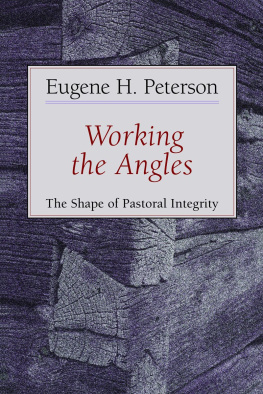Eugene Peterson - Working the Angles: The Shape of Pastoral Integrity
Here you can read online Eugene Peterson - Working the Angles: The Shape of Pastoral Integrity full text of the book (entire story) in english for free. Download pdf and epub, get meaning, cover and reviews about this ebook. year: 1989, publisher: Eerdmans, genre: Religion. Description of the work, (preface) as well as reviews are available. Best literature library LitArk.com created for fans of good reading and offers a wide selection of genres:
Romance novel
Science fiction
Adventure
Detective
Science
History
Home and family
Prose
Art
Politics
Computer
Non-fiction
Religion
Business
Children
Humor
Choose a favorite category and find really read worthwhile books. Enjoy immersion in the world of imagination, feel the emotions of the characters or learn something new for yourself, make an fascinating discovery.
- Book:Working the Angles: The Shape of Pastoral Integrity
- Author:
- Publisher:Eerdmans
- Genre:
- Year:1989
- Rating:3 / 5
- Favourites:Add to favourites
- Your mark:
- 60
- 1
- 2
- 3
- 4
- 5
Working the Angles: The Shape of Pastoral Integrity: summary, description and annotation
We offer to read an annotation, description, summary or preface (depends on what the author of the book "Working the Angles: The Shape of Pastoral Integrity" wrote himself). If you haven't found the necessary information about the book — write in the comments, we will try to find it.
Working the Angles: The Shape of Pastoral Integrity — read online for free the complete book (whole text) full work
Below is the text of the book, divided by pages. System saving the place of the last page read, allows you to conveniently read the book "Working the Angles: The Shape of Pastoral Integrity" online for free, without having to search again every time where you left off. Put a bookmark, and you can go to the page where you finished reading at any time.
Font size:
Interval:
Bookmark:

Working the Angles: The Shape of Pastoral Integrity is the second of three books on the work of pastors in North America. The three books together are designed to provide a biblical orientation and theological understanding in cultural conditions decidedly uncongenial to such orientation and understanding.
This second volume provides an antidote to the powerful pressures that reduce pastoral vocation to a managerial religious job of running a church by defining the distinctive work of the pastor as listening and helping others to listen to God as he speaks in Scripture, prayer, and the neighbor.
Five Smooth Stones for Pastoral Work is the first and Under the Unpredictable Plant: An Exploration in Vocational Holiness the third book in the series.
Wm. B. Eerdmans Publishing Co.
2140 Oak Industrial Drive NE, Grand Rapids, Michigan 49505
www.eerdmans.com
1987 Wm. B. Eerdmans Publishing Co.
All rights reserved
Published 1987
New completely reset edition published 1993
Printed in the United States of America
23 22 21 20 19 18 17 26 27 28 29 30 31 32
ISBN 978-0-8028-0265-1
Library of Congress Cataloging-in-Publication Data
Peterson, Eugene H., 1932
Working the angles.
1. Pastoral Theology. I. Title.
BV4011.P44 1987 253.2 87-5286
Unless otherwise noted, Scripture quotations are from the Revised Standard Version of the Bible, copyrighted 1946, 1952 1971, 1973 by the Division of Christian Education of the National Council of the Churches of Christ in the U.S.A., and used by permission.
For
Jeffrey Dirk Wilson
A MERICAN PASTORS are abandoning their posts, left and right, and at an alarming rate. They are not leaving their churches and getting other jobs. Congregations still pay their salaries. Their names remain on the church stationery and they continue to appear in pulpits on Sundays. But they are abandoning their posts, their calling. They have gone whoring after other gods. What they do with their time under the guise of pastoral ministry hasnt the remotest connection with what the churchs pastors have done for most of twenty centuries.
A few of us are angry about it. We are angry because we have been deserted. Most of my colleagues who defined ministry for me, examined, ordained, and then installed me as a pastor in a congregation, a short while later walked off and left me, having, they said, more urgent things to do. The people I thought I would be working with disappeared when the work started. Being a pastor is difficult work; we want the companionship and counsel of allies. It is bitterly disappointing to enter a room full of people whom you have every reason to expect share the quest and commitments of pastoral work and find within ten minutes that they most definitely do not. They talk of images and statistics. They drop names. They discuss influence and status. Matters of God and the soul and Scripture are not grist for their mills.
The pastors of America have metamorphosed into a company of shopkeepers, and the shops they keep are churches. They are preoccupied with shopkeepers concernshow to keep the customers happy, how to lure customers away from competitors down the street, how to package the goods so that the customers will lay out more money.
Some of them are very good shopkeepers. They attract a lot of customers, pull in great sums of money, develop splendid reputations. Yet it is still shopkeeping; religious shopkeeping, to be sure, but shopkeeping all the same. The marketing strategies of the fast-food franchise occupy the waking minds of these entrepreneurs; while asleep they dream of the kind of success that will get the attention of journalists. A walloping great congregation is fine, and fun, says Martin Thornton, but what most communities really need is a couple of saints. The tragedy is that they may well be there in embryo, waiting to be discovered, waiting for sound training, waiting to be emancipated from the cult of the mediocre.
The biblical fact is that there are no successful churches. There are, instead, communities of sinners, gathered before God week after week in towns and villages all over the world. The Holy Spirit gathers them and does his work in them. In these communities of sinners, one of the sinners is called pastor and given a designated responsibility in the community. The pastors responsibility is to keep the community attentive to God. It is this responsibility that is being abandoned in spades.
Hot indignation seizes me (Ps. 119:53). I dont know how many share my anger. I know a few names. Altogether there cant be very many of us. Are there yet seven thousand who have not bowed the knee to Baal? Are there enough to be identifiable as a minority? I think so. We recognize each other from time to time. And much has been accomplished by minorities. And there must be any number of shopkeepers who by now are finding the pottage that they acquired in exchange for their ordination birthright pretty tasteless stuff and are growing wistful for a restoration to their calling. Is the wistfulness an ember strong enough to blaze into a fierce repudiation of their defection, allowing the word of God again to become fire in their mouths? Can my anger apply a bellows to those coals?

Three pastoral acts are so basic, so critical, that they determine the shape of everything else. The acts are praying, reading Scripture, and giving spiritual direction. Besides being basic, these three acts are quiet. They do not call attention to themselves and so are often not attended to. In the clamorous world of pastoral work nobody yells at us to engage in these acts. It is possible to do pastoral work to the satisfaction of the people who judge our competence and pay our salaries without being either diligent or skilled in them. Since almost never does anyone notice whether we do these things or not, and only occasionally does someone ask that we do them, these three acts of ministry suffer widespread neglect.
The three areas constitute acts of attention: prayer is an act in which I bring myself to attention before God; reading Scripture is an act of attending to God in his speech and action across two millennia in Israel and Christ; spiritual direction is an act of giving attention to what God is doing in the person who happens to be before me at any given moment.
Always it is God to whom we are paying, or trying to pay, attention. The contexts, though, vary: in prayer the context is myself; in Scripture it is the community of faith in history; in spiritual direction it is the person before me. God is the one to whom we are being primarily attentive in these contexts, but it is never God-in-himself; rather, it is God-in-relationshipwith me, with his people, with this person.
None of these acts is public, which means that no one knows for sure whether or not we are doing any of them. People hear us pray in worship, they listen to us preach and teach from the Scriptures, they notice when we are listening to them in a conversation, but they can never know if we are attending to God in any of this. It doesnt take many years in this business to realize that we can conduct a fairly respectable pastoral ministry without giving much more than ceremonial attention to God. Since we can omit these acts of attention without anybody noticing, and because each of the acts involves a great deal of rigor, it is easy and common to slight them.
Next pageFont size:
Interval:
Bookmark:
Similar books «Working the Angles: The Shape of Pastoral Integrity»
Look at similar books to Working the Angles: The Shape of Pastoral Integrity. We have selected literature similar in name and meaning in the hope of providing readers with more options to find new, interesting, not yet read works.
Discussion, reviews of the book Working the Angles: The Shape of Pastoral Integrity and just readers' own opinions. Leave your comments, write what you think about the work, its meaning or the main characters. Specify what exactly you liked and what you didn't like, and why you think so.








